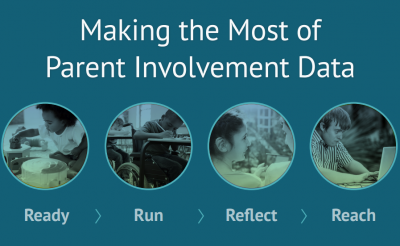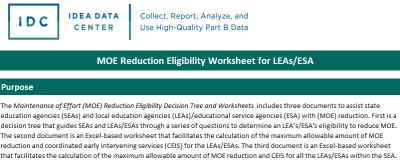
Resource Library
Guides. Briefs. Toolkits. Quick reference information. IDC and its partners created these data quality resources to help states better prepare to address their existing or emerging IDEA data quality needs. Use our search and filtering tools to navigate the library.
Resources 36 - 42 of 88
Format: Guides and Briefs
Methods for Assessing Racial/Ethnic Disproportionality in Special EducationThis TA guide addresses the more common methods for calculating racial/ethnic disproportionality in special education. IDC revised the guide, which the Data Accountability Center (DAC) originally published in October 2011, because of a change in SPP/APR Indicators 9 and 10 to remove underrepresentation from the measure.
Format: Guides and Briefs
Measuring Significant Discrepancy: An Indicator B4 Technical Assistance GuideThe TA guide describes the methods a state might use to appropriately determine which of its districts has a significant discrepancy (including a significant discrepancy by race or ethnicity) in the rates of out-of-school suspensions and expulsions totaling greater than 10 days for children with disabilities.
Format: Toolkits
Making the Most of Parent Involvement Data: Improving Quality and Enhancing UnderstandingThis toolkit is designed to assist states as they plan for and carry out their efforts to collect, report, analyze, and use high-quality parent and family involvement data. It defines key concepts; offers guidance on ways to improve the quality of the collection, analysis, and use of parent and family involvement data; and provides resources and tools to help states in their efforts parent involvement data efforts.
Format: Applications and Spreadsheets
Maintenance of Effort (MOE) Reduction Eligibility WorksheetsThe Maintenance of Effort (MOE) Reduction Eligibility Worksheets includes two documents to assist SEAs and LEAs/ESAs with MOE reduction. The first is an Excel-based worksheet that facilitates the calculation of the maximum allowable amount of MOE reduction and CEIS for the LEA/ESAs. The second document is an Excel-based worksheet that facilitates the calculation of the maximum allowable amount of MOE reduction and CEIS for all the LEAs/ESAs within the SEA.
Format: Applications and Spreadsheets
Maintenance of Effort (MOE) Reduction Eligibility Decision TreeThe Maintenance of Effort (MOE) Reduction Eligibility Decision Tree guides SEAs and LEAs/ESAs through a series of questions to determine an LEA’s/ESA's eligibility to reduce MOE.
Format: Applications and Spreadsheets
LEA EDFacts Edit Check and Data Display ToolsThe LEA EDFacts Edit Check and Data Display Tools allow states to identify potential business rule errors or errors in category sets, subtotals, or totals prior to submitting the data to OSEP via the EDFacts Submission System. The tool also provides states with user-friendly data summaries.
Format: Toolkits
LEA Data Processes ToolkitThere is a continuous need for state education agencies (SEAs) and local education agencies (LEAs) to collect and report comprehensive, high-quality data and ensure they report data accurately and in a timely fashion. The customizable IDC LEA Data Processes Toolkit is a new instrument that can improve decisionmaking about children and youth with disabilities by ensuring data are of high quality and processes are clearly defined and documented, while also providing data staff a map for documenting data processes within local districts.








